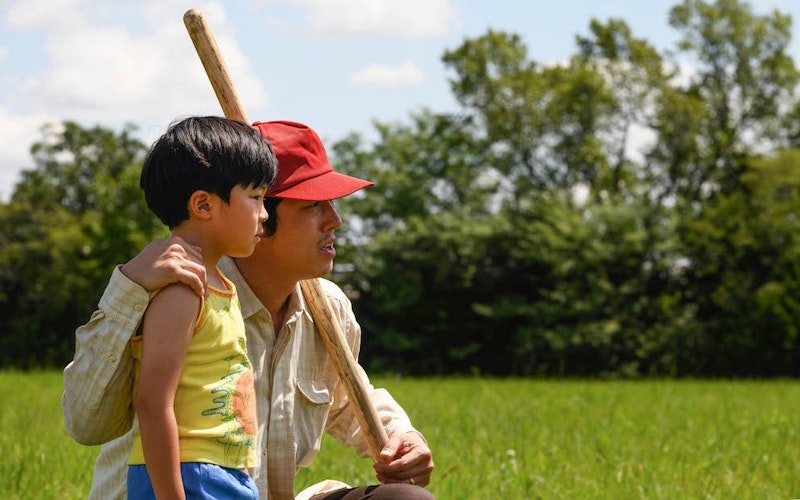
Movies
Minari: Cursed Ground or Garden of Eden?
About four minutes into Minari, an Oscar-nominated film that follows a Korean immigrant family trying to start a new life in America in the 1980s, we get our first of many biblical references.
The family patriarch, Jacob Yi (Best Actor nominee Steven Yeun), triumphantly declares that the fifty-acre plot of land he has purchased in Arkansas is the family’s very own “garden of Eden.” While his wife Monica (Yeri Han) and children Anne (Noel Cho) and David (Alan Kim) view his dream with measured suspicion, Jacob urges them to have mustard seed-sized faith. From a visual perspective, director Lee Isaac Chung and cinematographer Lachlan Milne initially take Jacob’s side. With shots of sunlight reflecting off of lush foliage to panoramic views of open fields, the filmmaking suggests that in Arkansas there are only dreams to be planted (and that the only serpents are those at a nearby creek).
But from tornado warnings to water problems to language barriers, Jacob realizes that immigrant dreams do not easily take root in coarse and unwelcoming American soil. Shots of emaciated vegetables and vociferous shouting matches between Jacob and Monica smother the promise of abundance hinted at and prosperity wished for. While Jacob beats his body to submission in order to ensure the success of his “garden,” his willingness to work at the cost of his relationship with his family indicates a post-Fall understanding of work, one where labor is fiercely tangled with one’s own sense of worth, identity, and dignity.
Before the Fall, Adam was given the task to name all the creatures God had made. This honor of labeling the birds and beasts was truly and purely an act of worship, born out of a surety of Adam’s identity as being an image-bearer of the Creator. After the Fall, Adam’s work became conflated with his worth. God’s judgment to Adam, in which the ground is cursed and Adam must eat by the “sweat of his brow,” meant that work was no longer the outflow of identity, but in competition with it. In Minari, this post-Fall reality is clearly lived and breathed for Jacob, who not only toils on his own farm but also works separating male and female chicks at a nearby poultry facility. After finishing a shift, he candidly tells David that male chicks get discarded because they “don’t taste good. They can’t lay eggs and have no use. So, you and I should try to be useful.”
The repercussions of this worldview come head to head in another argument between Jacob and Monica. While waiting to speak to a doctor about David’s heart condition, Monica somberly asks Jacob if he would consider leaving Arkansas to go back to California, where their life was more stable. “I can’t do this without you,” she pleads. Jacob coldly retorts, “You go ahead and do what you want. Even if I fail, I have to finish what I started.” In that moment, he chooses his own prosperity over the family’s stability. To him, the others are male chicks who can be discarded.
TC Podcast: Family (WandaVision, Minari)
Thankfully, the film’s climax offers a counter portrait, arguing that value need not be tied to usefulness or productivity. (Spoilers ahead.) While the Yis are away at the doctor’s office, Monica’s mother, Soonja (Youn Yuh-Jung), who has come to live with them on the farm and previously suffered a stroke, stays behind to rest. Still, she feels she must keep herself busy and useful, so even though she has a weakened arm she attempts to bring garbage to the trash bin outside and burn it. Just like Jacob, Soonja is propelled by a desire to accomplish, even at the expense of her own health. When a piece of flaming garbage falls from the bin, her struggle to retrieve it evokes an earlier sequence, in which Jacob’s arms are so sore after a day of work that he needs Monica’s help to remove his shirt. Soonja’s ailment gets the better of her and she drops the garbage, which ignites the surrounding hay and ends up engulfing the nearby storehouse. As the inferno ravenously consumes the cornucopia of fresh produce, a dazed Soonja begins walking away from the farm as a form of self-banishment. When the Yis return, she is touchingly guided back home by David.
Soonja’s impulse to leave acts as a hauntingly hypothetical foreshadowing of the ending of Jacob’s own path, where the only outcome for the “useless” is a fiery expulsion. Yet ironically, the only crop to survive the fire are the titular minari seeds that have been planted by Soonja in the nearby creek. It is the minari, an herb Jacob paid no attention to and had no hand in cultivating, that not only is the last crop standing, but now the very sustenance for the Yi family as they attempt to rebuild their farm. The “useless” thing of the garden ended up being the most important; its value was tied merely to the fact that it existed and survived.
While Minari harrowingly articulates the ways the Fall has warped humanity’s relationship to work, its ending brought me back to the creation story, where we see a God who created purely out of love. As Jacob and David pluck the minari, Jacob praises Soonja for her resourcefulness and wisdom. Even after utter destruction and desolation, there is still a new garden to cultivate and new crops to plant. In the fields of Arkansas, there is the hope of glorious restoration, beginning with the embrace of the seemingly useless and unnecessary.
Topics: Movies